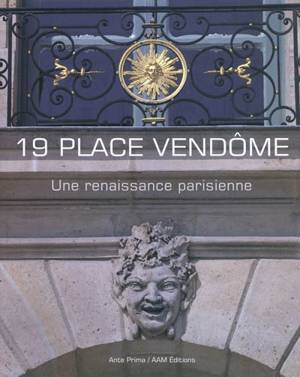
- Retrait gratuit dans votre magasin Club
- 7.000.000 titres dans notre catalogue
- Payer en toute sécurité
- Toujours un magasin près de chez vous
- Retrait gratuit dans votre magasin Club
- 7.000.0000 titres dans notre catalogue
- Payer en toute sécurité
- Toujours un magasin près de chez vous
Description
Une renaissance parisienne
Les remarquables hôtels d'Évreux - bâti sous Louis XIV sur la place Vendôme -, Desvieux et Castanier - érigés rue des Capucines sous le règne de son successeur - constituèrent à partir de 1854 le siège social du tout nouveau Crédit Foncier de France, mis alors en place pour financer les grands travaux du baron Haussmann sous le second Empire.
Remanié au XIXesiècle et augmenté au suivant de deux immeubles de bureaux rue Cambon, cet exceptionnel ensemble patrimonial - revendu en 2003 à un fonds privé - vient de renouer après sept ans d'études et de travaux avec sa splendeur passée.
En effet, sous la maîtrise d'ouvrage de Vinci Immobilier et d'ADIM, Anthony Béchu - architecte du patrimoine - et Alain-Charles Perrot - architecte en chef des monuments historiques - ont imaginé sa renaissance, mise en oeuvre par plus de cinq cents compagnons et ouvriers issus de soixante-seize entreprises, pilotées par Vinci Construction.
Ce livre leur rend hommage en restituant les multiples facettes de cette vaste aventure humaine et technique qui apporte sa pierre à l'ambition de Paris de demeurer la capitale internationale des arts.
The stunning Hôtel d'Évreux - built on place vendôme under Louis XIV - and the Hôtel Desvieux and the Hôtel Castanier - erected on rue des Capucines during his successor's reign - became home, in 1854, to the newly-founded Crédit Foncier de France headquarters, set up to finance Baron Haussmann's ambitious construction projects during the Second Empire.
Renovated in the 19th century, and extended into two office buildings in rue Cambon in the 20th century, this exceptional heritage site - sold to a private fund in 2003 - has been restored to its former glory after seven years of planning and works.
Indeed, general contractors Vinci Immobilier, ADIM, Anthony Béchu - Heritage Architect - and Alain-Charles Perrot - Chief Architect of Historical Monuments - laid out a vision for restoring the site, which was brought about by over five hundred colleagues and construction workers from seventy six companies, led by Vinci Construction.
This book pays tribute to them by laying bare the many facets of this enterprising project which, in all its human and technical dimensions, seeks to support the Parisian ambition to remain the international capital of the arts.
Spécifications
Parties prenantes
- Auteur(s) :
- Editeur:
Contenu
- Nombre de pages :
- 172
- Langue:
- Français, Anglais
Caractéristiques
- EAN:
- 9782871432302
- Date de parution :
- 16-12-10
- Format:
- Livre relié
- Dimensions :
- 300 mm x 250 mm
- Poids :
- 1210 g

Les avis
Nous publions uniquement les avis qui respectent les conditions requises. Consultez nos conditions pour les avis.






